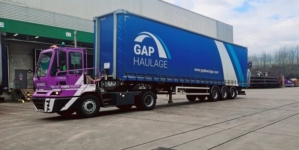-
Nutrivend selects Forterro’s Orderwise to support online expansion and streamline operations - April 11, 2025
-
ARROWXL LAUNCHES AMBITIOUS ZERO WASTE ROADMAP - April 8, 2025
-
THE BCMPA’S NEW CAMPAIGN DRIVES OUTSOURCING SUCCESS IN Q1 - April 7, 2025
-
BLACKOUT TECHNOLOGIES TARGETS TELEMATICS-INTEGRATED MOBILE DEVICE BLOCKING TO COMBAT SMARTPHONE DISTRACTION - April 1, 2025
-
Sparck Technologies awarded Royal designation - March 27, 2025
-
OpenADR Alliance announces first OpenADR 3.0 certified products with EVoke Systems, E.ON Energy and Universal Devices - March 25, 2025
-
Growing fulfilment and contract packer appoints new Managing Director - March 25, 2025
-
When is it time to invest in a WMS? Understanding the key trigger points - March 25, 2025
-
eCapital helps Vantage Recruitment on its journey to financial success - March 24, 2025
-
Hugo Beck Celebrates 70 Years of Packaging Innovation with Open House Events - March 20, 2025
Tech and Data Trends Logistics Businesses Need to Know
Business IT and data solutions are ever evolving and it’s easy to get left behind, especially for anyone with limited tech knowledge. Here, Nathan Hill-Haimes looks at some of today’s biggest data solutions that you need to know to keep your logistics business as forward facing as possible.
Data Privacy
Data privacy has become a major concern for people and organisations all across the world. Many major leaks of private data have been reported globally and have increased the need for organisations to proactively address these concerns. With new General Data Protection Regulations coming into effect earlier this year, many UK businesses have given their data management an overhaul – it’s likely that we will see further developments in how data is stored and encrypted going forward in order to limit access to sensitive information.
Augmented Analytics
Augmented analytics changes and automates how analytical content is consumed and used; it’s likely this will become a mainstream component of data management across a variety of business sectors. Other business departments, such as HR, finance, sales, marketing, procurement, customer service and asset management can also make use of automated insights from augmented analytics. This helps to optimize the decisions and actions of all employees across specific contexts.
Business Broadband
The business sector is continuing to push broadband providers for the best comms services possible, opting for either ADSL, fibre or a leased line, depending on their requirements. Public WiFi is steadily becoming more widely available across the UK and there is a lot of competition on the high-street to provide the best WiFi services, so it’s likely we will see accessible networks for customers across all major cities in the very near future. We also continually see improvements in Internet security, but there are now more options to protect your organisation and systems when online.
VoIP
VoIP, or ‘voice over Internet Protocol’, has seen a rapid rise in popularity over the last few years. It’s basically a way of making phone calls over the Internet without using a traditional analogue phone line. VoIP has many benefits over analogue phone lines; it’s less expensive once it has been set up and can allow users to make phone calls completely for free. VoIP also allows users to connect to the phone system from outside the premises, so they can make and receive calls via smartphone.
About the Author
Nathan Hill-Haimes is the founder of Amvia, a privately-owned, voice, data and cloud application provider based in Sheffield, UK which supplies services to companies of all sizes. For more information, please visit www.amvia.co.uk
































